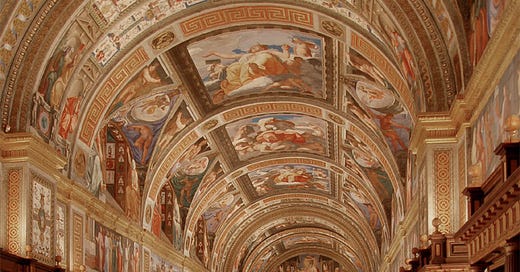Iberian “scholars of fortune” played a crucial role in an interpersonal system of political communication—bibliopolitics, which refers to the exchange of books (printed and/or manuscript) along with political information, a practice that was particularly prevalent across European states during the first part of the seventeenth century.1
Archival Arsenals as Currency
Men of letters deployed their legal and historiographical expertise in several intelligence systems, sometimes becoming double if not triple or quadruple agents. These manifold affiliations put them in a privileged position to build archival arsenals to use as currency across states at war. 2
The special issue of Pacific Coast Philology, “Libraries, Archives, Properties”3 includes a Forum section, “Wars of Knowledge,” a series of articles analyzing “Iberian imperial hegemony and the assembly of libraries.” Libraries are a form of war by other means, as it were. Diplomats and humanists, sometimes in the same person, engaged in legal and extralegal efforts to obtain the books and objects that would enhance the status and prestige, and hence the power, of the crown, and also benefit these agents themselves. 4
Vicente Nogueira
I commend the writing of Montcher5 whose observations are quite arch quoting Vicente Nogueira, (1586-1654):
he criticized the book-binding policies of Philip II (El Escorial)
he preferred that all books he sent to Niza be lost in the Mediterranean rather than that any be sequestered by his arch-enemies, the inquisitors. (Nice)
There is not much in English to read about Vicente Nogueira ( he does have an article in the Portuguese Wikipedia).6 Montcher’s discussion of Nogueira as a man for whom the commerce of bibliopolitics was also a way to survive economically has me anticipating Montcher’s forthcoming book, Scholars of Fortune: Scholarship and the Making of Politics in Early Modern Empires, which will analyze how political communication and agents of cultures of knowledge interacted with early modern revolts and wars. 7
Montcher, Fabien. "Early Modern Bibliopolitics: From a Seventeenth-Century Roman-Iberian Perspective." Pacific Coast Philology 52, no. 2 (2017): 206-218.
Ibid.
Ganim, John M. "Libraries, Archives, Properties." Pacific Coast Philology 52, no. 2 (2017): 145-148. 114th Annual Conference of the Pacific Ancient and Modern Language Association, held in Pasadena in 2016. The theme of the conference, “Libraries, Archives, Properties,” was meant to address the looming crisis in the preservation of records of our cultures, mostly printed or written, but also visual and aural.
Ibid. and Pelegrín, Marta Albalá. "Wars of Knowledge: Iberian Imperial Hegemony and the Assembling of Libraries." Pacific Coast Philology 52, no. 2 (2017): 166-172.
Ibid., Montcher. Some of his work is open access.
I wish I could read this: Nogueira, Vicente, and Andrée Crabbé Rocha. Cartas inéditas ou dispersas de Vicente Nogueira. s.l: s.n, 1972.
While we wait for the book we can read: Montcher, Fabien. " Politics, Scholarship, and the Iberian Routes of the Republic of Letters: The Late Renaissance Itinerary of Vicente Nogueira (1586–1654), Erudition and the Republic of Letters 2, 2 (2017): 182-225.-The trajectory of Vicente Nogueira (1586–1654) demonstrates how an Iberian intellectual who was well attuned to the composite governmental structure of the Iberian empire (c.1580–c.1640) strengthened the ties between state communication systems and learned communities during the Late Renaissance. This article highlights the political valence of historical knowledge that was gathered and distributed throughout the Republic of Letters with emphasis on the code-switching of a scholar who styled himself differently across learned communities depending on his political circumstances, interests, and interlocutors. The study of Nogueira’s itinerary demonstrates the need for a history of early modern scholarship that takes into account the ways that early modern politics and state communication systems were connected by learned networks.





This is far more interesting than it should be... thanks for this!
"The study of Nogueira’s itinerary demonstrates the need for a history of early modern scholarship that takes into account the ways that early modern politics and state communication systems were connected by learned networks."
'...that early european empires would've fallen apart without.'
"The theme of the conference, “Libraries, Archives, Properties,” was meant to address the looming crisis in the preservation of records of our cultures, mostly printed or written, but also visual and aural. "
Ya know, back in 2009, I was arguing one of the infrastructure things the Obama administration could do would be to expand and convert the LoC into a National Library System and hire a bunch of people to not just scan but OCR, convert and typeset all those old print works into readable and pretty-printed for the screen stuff that would be filed online properly. Toss in scanning of literally everything printed, plus buy up all those old video games, OSes and utility and manuals (and the rights thereof). Once all that stuff was properly converted and filed, it's done more or less forever. Find anything quick and access it quick and quote it quick, and the data mines are wide open.
The Very Smart political people gave me the internet equivalent of a dull-eyed stare and went back to arguing about cutting the deficit and bombing Iran. Could be a brilliant lot... just ain't.
"This article highlights the political valence of historical knowledge that was gathered and distributed throughout the Republic of Letters with emphasis on the code-switching of a scholar who styled himself differently across learned communities depending on his political circumstances, interests, and interlocutors."
I am very tempted to say 'doesn't everybody code switch like that?'
elm
like a fish swimming